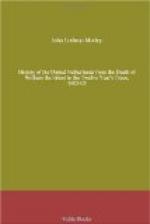The ambassadors; with an Arab interpreter, were duly presented to Prince Maurice in the lines before the city of Grave. Certainly no more favourable opportunity could have been offered them for contrasting the reality of military power, science, national vigour; and wealth, which made the republic eminent among the nations, with the fiction of a horde of insignificant and bloodthirsty savages which her enemies had made so familiar at the antipodes. Not only were the intrenchments bastions, galleries, batteries, the discipline and equipment of the troops, a miracle in the eyes of these newly arrived Oriental ambassadors, but they had awakened the astonishment of Europe, already accustomed to such spectacles. Evidently the amity of the stadholder and his commonwealth was a jewel of price, and the King of Achim would have been far more barbarous than he had ever deemed the Dutchmen to be, had he not well heeded the lesson which he had sent so far to learn.
The chief of the legation, Abdulzamar, died in Zeeland, and was buried with honourable obsequies at Middleburg, a monument being raised to his memory. The other envoys returned to Sumatra, fully determined to maintain close relations with the republic.
There had been other visitors in Maurice’s lines before Grave at about the same period. Among others, Gaston Spinola, recently created by the archduke Count of Bruay, had obtained permission to make a visit to a wounded relative, then a captive in the republican camp, and was hospitably entertained at the stadholder’s table. Maurice, with soldierly bluntness, ridiculed the floating batteries, the castles on wheels, the sausages, and other newly-invented machines, employed before Ostend, and characterized them as rather fit to catch birds with than to capture a city, defended by mighty armies and fleets.
“If the archduke has set his heart upon it, he had far better try to buy Ostend,” he observed.
“What is your price?” asked the Italian; “will you take 200,000 ducats?”
“Certainly not less than a million and a half,” was the reply; so highly did Maurice rate the position and advantages of the city. He would venture to prophesy, he added, that the siege of Ostend would last as long as the siege of Troy.
“Ostend is no Troy,” said Spinola with a courtly flourish, “although there are certainly not wanting an Austrian Agamemnon, a Dutch Hector, and an Italian Achilles.” The last allusion was to the speaker’s namesake and kinsman, the Marquis Anibrose Spinola, of whom much was to be heard in the world from that time forth.
Meantime, although so little progress had been made at Ostend, Maurice had thoroughly done his work before Grave. On the 18th September the place surrendered, after sixty days’ siege, upon the terms usually granted by the stadholder. The garrison was to go out with the honours of war. Those of the inhabitants who wished to leave were to leave; those who preferred staying were to stay; rendering due allegiance to the republic, and abstaining in public from the rites of the Roman Church, without being exposed, however, to any inquiries as to their religious opinions, or any interference within their households.




